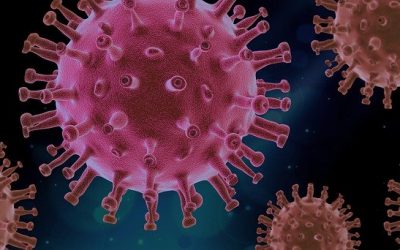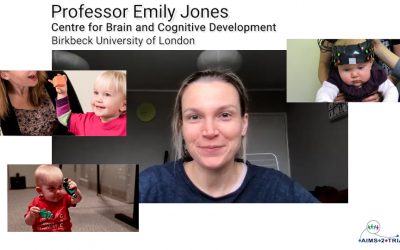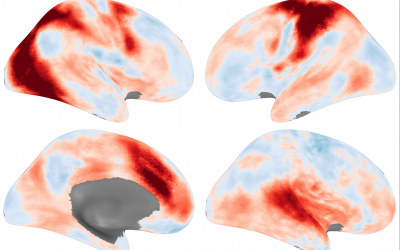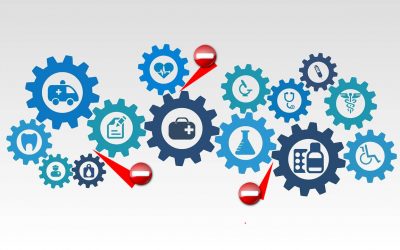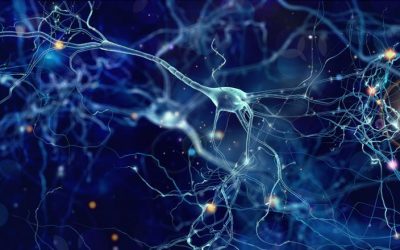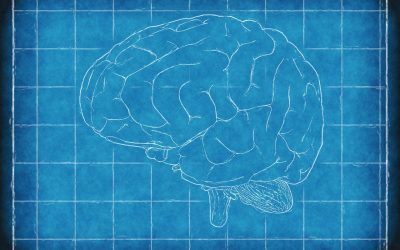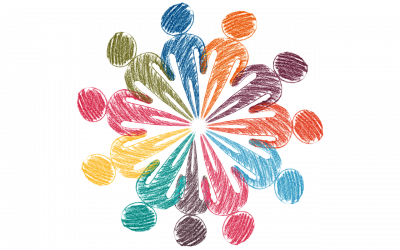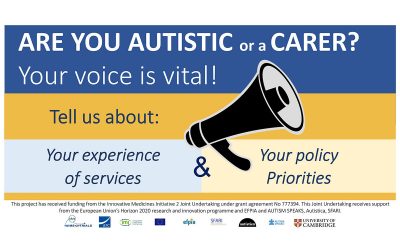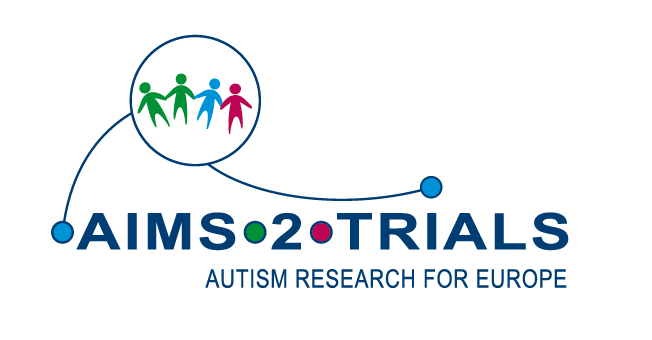AIMS-2-TRIALS Newsletter #2
June 2021“This has been an extremely eventful year with much to be proud of, despite the pandemic. We received favourable feedback from the European Medicines Agency, our policy research was mentioned at a meeting of the Parliamentary Assembly of the Council of Europe, and we successfully proceeded to part 2 of our funding with the IMI. We are proud of our ongoing work with ‘A-Reps’, a group of autistic people and carers who are collaborating with us to find ways they can meaningfully contribute to the work of the consortium. This group sits on a number of Working Groups on key topics and we have recently created a regular online meeting where researchers and A-Reps can get together in small groups for discussion. We are grateful for their hard work and look forward to continued progress in this endeavour as well as in our research. On top of this, two of our AIMS-2-TRIALS colleagues have received high honours in their respective countries, as you’ll read below. Last, but by no means least, a great deal of high quality research has been published by consortium members, and there are several familiar names appearing in a list of ‘highly-cited’ researchers. We wish all of you, as well as our consortium colleagues, success in the year to come.”
Want to receive this newsletter by email? Subscribe here.
Research News
COVID exacerbates healthcare inequalities for autistic people
According to a new AIMS-2-TRIALS study, the COVID-19 pandemic has further exacerbated existing healthcare inequalities for autistic people and has likely contributed to disproportionate increases in morbidity and mortality, mental health/ behavioural difficulties and reduced quality of life. Researchers, clinicians and the autism community are calling for urgent updates to policies and guidelines regarding the accessibility of COVID-19 (and broader healthcare) services to prevent the...
Attentive brain states to faces in infants with and without later autism
Autistic children can have differing preferences for social stimuli such as faces compared to non-social stimuli, and research suggests that differences in brain activity could underlie this and be predictive of later autism. A team of researchers including Dr Anna Gui and Prof Emily Jones at the Centre for Brain and Cognitive Development (CBCD, Birkbeck College, University of London) and King’s College London, carried out research to understand how individual differences in brain activity in...
VIDEO: AIMS-2-TRIALS research into autism subtypes at Birkbeck
Professor Emily Jones and her team at Birkbeck University of London are undertaking a range of research activities that follow children from infancy, or even pregnancy, into later childhood. Many of the children have parents or older siblings who are autistic and therefore have an increased likelihood of being diagnosed with autism themselves. This research is helping us understand the causes of autism and to identify potential subtypes, which would allow interventions or support strategies to...
Distinct behavioural profiles of autism matter
New AIMS-2-TRIALS research finds that autistic people with more social communication difficulties have different brain connectivity compared to autistic people with an equal mix of social traits and repetitive behaviours. A diagnosis of autism includes the presence of specific social-communicative and restrictive-repetitive behaviours. There is, however, notable variability in how autistic people are affected across the two domains and some may have more traits in one domain relative to the...
Reviewing healthcare barriers for autistic people
A recently-published systematic review aimed to identify the range of healthcare barriers faced by autistic people across their life span. This work was carried out by a team of researchers that included Joaquín Fuentes of the AIMS-2-TRIALS consortium. Background Autism is associated with a wide range of developmental, mental health and physical health difficulties (including but not restricted to ADHD, depression, anxiety and epilepsy) with each autistic person experiencing a different set of...
New white paper published on a framework for drug discovery in autism
This paper provides a summary of the proceedings of the ‘New Frontiers Meeting’ on neurodevelopmental disorders organised by the European College of Neuropsychopharmacology in conjunction with the AIMS-2-TRIALS consortium. The meeting brought together experts in developmental genetics, autism, neurodevelopmental disorders, and clinical trials from academia and industry, regulators, patient and family associations, and other stakeholders. The meeting sought to provide a platform for focused...
Cellular memory of mother’s viral infection could play a role in child’s later brain development
Research led by King’s College London has provided insight into why exposure to inflammation caused by a viral infection during pregnancy may increase the likelihood of altered brain development later on in childhood.Many thanks to KCL for their permission to reproduce this article from their website. Published in the journal Science Advances, the study investigated the role of the immune system very early in brain development and results suggest that immune signals are not only involved in...
Are there differences in the brains of autistic men and women?
Around three times as many males are diagnosed with autism than females, which suggests that sex-related biological factors play a key role in its development. However, little is known about the ways that autistic males and females differ in terms of brain structure and function. One factor that has particularly hindered researchers to date is that very limited data exists relating to autistic females. Existing research on sex differences has been contradictory It is widely accepted that the...
How quality of life is influenced by depression and anxiety in autism
'Quality of life’ is the satisfaction or general wellbeing that each individual experiences in different aspects of their everyday life, such as their health, education, employment and social relationships. Past research studies have suggested that, on average, autistic individuals experience a lower quality of life than those without autism. However, it is unclear how much of this might be explained by anxiety or depression symptoms, which affect at least 20-50% of autistic people....
Understanding placebo response in clinical trials with autistic people
Placebos, such as sugar pills or saline injections, are designed to have no direct effects, yet treatment with placebo can substantially improve symptoms across many conditions. This is called a placebo response or placebo effect. Researchers often compare results for a group of people who take a placebo with a group who take a new medication, to really understand whether the medication is having a helpful effect. There is still no approved medication for the core symptoms of autism,and all...
Click here for a full list of AIMS-2-TRIALS publications
Community News
Want to get involved?
If you are interested in joining any of our public webinars commencing Autumn 2021, you can sign up here.
We also publish details about studies that are looking for participants on our participant recruitment page.
What services do autistic people want? What improvements are needed? Let policymakers know.
Many autistic people will tell you they have struggled to access a service, or perhaps more than one, but policymakers need concrete evidence of gaps in services and genuine need. To address this problem, we have designed ACCESS-EU and 10 Points for Change, two surveys exploring experiences of autistic people and carers when accessing services across Europe and beyond, and policy priorities,...
What do AIMS-2-TRIALS Autism Representatives (A-Reps) do?
Autistic people have long made the case that they should be involved in research about them and many researchers now consider this to be part of the standard research process. This involvement is sometimes referred to as ‘participatory research’ and can be done in a variety of ways, leading to different levels of impact on the research. Researchers are encouraged to involve autistic people from...
UPDATE: Favourable feedback from European Medicines Agency
Letters of support now available on the EMA website. The AIMS-2-TRIALS consortium has received feedback (qualification advice) from the European Medicines Agency (EMA) on the further exploration of EEG (electroencephalography) as a potential ‘biomarker’ in autism research. Finding measures to identify subgroups of autistic people – known as ‘stratification biomarkers’ – is crucial for research,...
European Society of Child and Adolescent Psychiatry endorses AIMS-2-TRIALS partner publication
AIMS-2-TRIALS partner and Autism Champion Dr. Joaquin Fuentes, and colleagues Dr. Amaia Hervás and Dr. Patricia Howlin have released a new open-access publication: "ESCAP practice guidance for autism: a summary of evidence-based recommendations for diagnosis and treatment". In 2018, the European Society of Child and Adolescent Psychiatry (ESCAP) identified the need for an Autism Practice...
Early Career Researcher? Join ECRAN
Join our Early career Researcher Autism network (ECRAN) for access to workshops and online training resources, as well as a network of researchers with an interest in autism. ECRAN provides opportunities for collaboration access Europe and beyond. Find out more about the Early Career Researcher Autism Network by emailing the ECRAN committtee or visiting bit.ly/joinECRAN
New AIMS-2-TRIALS database developed by Institut Pasteur
A world-leading AIMS-2-TRIALS team at the Institut Pasteur (Paris) has developed a secure database to address the needs of the AIMS-2-TRIALS project, ensuring that large, multidisciplinary datasets from participants across Europe are secure, GDPR compliant and easily accessible to authorized users. The database has been accessible to the AIMS-2-TRIALS community since July 2019 and is almost...
Awards & More

Huge congratulations are due to our AIMS-2-TRIALS colleagues Jan Buitelaar, who has been awarded the Knight of the Order of the Netherlands Lion, and Simon Baron-Cohen, who received a Knights Batchelor in the Queen’s 2021 New Year’s Honours list.
AIMS-2-TRIALS colleagues feature on highly-cited researchers list
Congratulations to Simon Baron-Cohen, Jan Buitelaar and Tony Charman, who are among those identified as highly-cited researchers in the 2020 list published by Web of Science. Watch the webinar to find out what it means to be a highly cited researcher. https://clarivate.com/webofsciencegroup/what-it-means-to-be-a-highly-cited-researcher/
Professors Emily Jones and Tony Charman are guests on the PsychologiCall Podcast
Listen to AIMS-2-TRIALS researchers Professor Emily Jones and Professor Tony Charman discuss their work in two separate episodes. Professor Emily Jones talks about her research looking at how changes in early brain activity may predict later cognitive skills in neurodiverse cohorts. Listen here. To read more about this work, see Emily’s...
German TV documentary: Autismus – Eine Welt für sich? (Autism: A world of its own?)
AIMS-2-TRIALS colleagues Nico Bast, Christine Freitag and Christine Ecker of Goethe University Frankfurt were recently featured in a German TV documentary aiming to explain autism to a broader audience. The team described their current research: Professor Christine Freitag discussed diagnosis, current guidelines on treatment, and early...
AIMS-2-TRIALS at Events
INSAR (International Society for Autism Research): 3-7 May 2021
EACD (European Academy of Childhood Disability): 20 May 2021
Annual Meeting of the Spanish Association for Child and Adolescent Psychiatry: 3-4 June 2021
OHBM (Organisation for Human Brain Mapping): 21-25 June 2021
WAIMH (World Association for Infant Mental Health): 22-26 June 2021
British Association for Psychopharmacology Summer Meeting: 19-21 July 2021
ECNP Congress: 2-5 October 2021
Subscribers will receive AIMS-2-TRIALS newsletters approximately once per year.
Our website use Google Analytics, a web analytics service provided by Google, Inc. (“Google”). For full details please read our Privacy Policy and Imprint & Disclaimer.
Please note that MailChimp uses click-tracking technology and may use your personal information according to its Terms and Conditions. Find out more at the MailChimp Privacy Policy.
AIMS-2-TRIALS Newsletter #2
June 2021Research News
Community News
Awards & More
Events
“This has been an extremely eventful year with much to be proud of, despite the pandemic. We received favourable feedback from the European Medicines Agency, our policy research was mentioned at a meeting of the Parliamentary Assembly of the Council of Europe, and we successfully proceeded to part 2 of our funding with the IMI. We are proud of our ongoing work with ‘A-Reps’, a group of autistic people and carers who are collaborating with us to find ways they can meaningfully contribute to the work of the consortium. This group sits on a number of Working Groups on key topics and we have recently created a regular online meeting where researchers and A-Reps can get together in small groups for discussion. We are grateful for their hard work and look forward to continued progress in this endeavour as well as in our research. On top of this two of our AIMS-2-TRIALS colleagues have received high honours in their respective countries, as you’ll read below, and a great deal of high quality research has been published by consortium members. Several familiar names appear in a list of ‘highly-cited’ researchers.”
Want to receive this newsletter by email? Subscribe here.
Click here for a full list of AIMS-2-TRIALS publications
Back to top
Research News
COVID exacerbates healthcare inequalities for autistic people
According to a new AIMS-2-TRIALS study, the COVID-19 pandemic has further exacerbated existing healthcare inequalities for autistic people and has likely contributed to disproportionate increases in morbidity and mortality, mental health/ behavioural difficulties and reduced quality of life....
Attentive brain states to faces in infants with and without later autism
Autistic children can have differing preferences for social stimuli such as faces compared to non-social stimuli, and research suggests that differences in brain activity could underlie this and be predictive of later autism. A team of researchers including Dr Anna Gui and Prof Emily Jones at the...
VIDEO: AIMS-2-TRIALS research into autism subtypes at Birkbeck
Professor Emily Jones and her team at Birkbeck University of London are undertaking a range of research activities that follow children from infancy, or even pregnancy, into later childhood. Many of the children have parents or older siblings who are autistic and therefore have an increased...
Distinct behavioural profiles of autism matter
New AIMS-2-TRIALS research finds that autistic people with more social communication difficulties have different brain connectivity compared to autistic people with an equal mix of social traits and repetitive behaviours. A diagnosis of autism includes the presence of specific social-communicative...
Reviewing healthcare barriers for autistic people
A recently-published systematic review aimed to identify the range of healthcare barriers faced by autistic people across their life span. This work was carried out by a team of researchers that included Joaquín Fuentes of the AIMS-2-TRIALS consortium. Background Autism is associated with a wide...
New white paper published on a framework for drug discovery in autism
This paper provides a summary of the proceedings of the ‘New Frontiers Meeting’ on neurodevelopmental disorders organised by the European College of Neuropsychopharmacology in conjunction with the AIMS-2-TRIALS consortium. The meeting brought together experts in developmental genetics, autism,...
Cellular memory of mother’s viral infection could play a role in child’s later brain development
Research led by King’s College London has provided insight into why exposure to inflammation caused by a viral infection during pregnancy may increase the likelihood of altered brain development later on in childhood.Many thanks to KCL for their permission to reproduce this article from...
Are there differences in the brains of autistic men and women?
Around three times as many males are diagnosed with autism than females, which suggests that sex-related biological factors play a key role in its development. However, little is known about the ways that autistic males and females differ in terms of brain structure and function. One factor that...
How quality of life is influenced by depression and anxiety in autism
'Quality of life’ is the satisfaction or general wellbeing that each individual experiences in different aspects of their everyday life, such as their health, education, employment and social relationships. Past research studies have suggested that, on average, autistic individuals experience a...
Understanding placebo response in clinical trials with autistic people
Placebos, such as sugar pills or saline injections, are designed to have no direct effects, yet treatment with placebo can substantially improve symptoms across many conditions. This is called a placebo response or placebo effect. Researchers often compare results for a group of people who take a...
Back to top
Community News
Want to get involved?
If you are interested in joining any of our public webinars commencing Autumn 2021, you can sign up here.
We also publish details about studies that are looking for participants on our participant recruitment page.
What services do autistic people want? What improvements are needed? Let policymakers know.
Many autistic people will tell you they have struggled to access a service, or perhaps more than one, but policymakers need concrete evidence of gaps in services and genuine need. To address this problem, we have designed ACCESS-EU and 10 Points for Change, two surveys exploring experiences of autistic people and carers when accessing services...
What do AIMS-2-TRIALS Autism Representatives (A-Reps) do?
Autistic people have long made the case that they should be involved in research about them and many researchers now consider this to be part of the standard research process. This involvement is sometimes referred to as ‘participatory research’ and can be done in a variety of ways, leading to different levels of impact on the research....
UPDATE: Favourable feedback from European Medicines Agency
Letters of support now available on the EMA website. The AIMS-2-TRIALS consortium has received feedback (qualification advice) from the European Medicines Agency (EMA) on the further exploration of EEG (electroencephalography) as a potential ‘biomarker’ in autism research. Finding measures to identify subgroups of autistic people – known as...
European Society of Child and Adolescent Psychiatry endorses AIMS-2-TRIALS partner publication
AIMS-2-TRIALS partner and Autism Champion Dr. Joaquin Fuentes, and colleagues Dr. Amaia Hervás and Dr. Patricia Howlin have released a new open-access publication: "ESCAP practice guidance for autism: a summary of evidence-based recommendations for diagnosis and treatment". In 2018, the European Society of Child and Adolescent Psychiatry (ESCAP)...
Early Career Researcher? Join ECRAN
Join our Early career Researcher Autism network (ECRAN) for access to workshops and online training resources, as well as a network of researchers with an interest in autism. ECRAN provides opportunities for collaboration access Europe and beyond. Find out more about the Early Career Researcher Autism Network by emailing the ECRAN committtee or...
New AIMS-2-TRIALS database developed by Institut Pasteur
A world-leading AIMS-2-TRIALS team at the Institut Pasteur (Paris) has developed a secure database to address the needs of the AIMS-2-TRIALS project, ensuring that large, multidisciplinary datasets from participants across Europe are secure, GDPR compliant and easily accessible to authorized users. The database has been accessible to the...
Back to top
Awards & More

Huge congratulations are due to our AIMS-2-TRIALS colleagues Jan Buitelaar, who has been awarded the Knight of the Order of the Netherlands Lion, and Simon Baron-Cohen, who received a Knights Batchelor in the Queen’s 2021 New Year’s Honours list.
AIMS-2-TRIALS colleagues feature on highly-cited researchers list
Congratulations to Simon Baron-Cohen, Jan Buitelaar and Tony Charman, who are among those identified as highly-cited researchers in the 2020 list published by Web of Science. Watch the webinar to...
Professors Emily Jones and Tony Charman are guests on the PsychologiCall Podcast
Listen to AIMS-2-TRIALS researchers Professor Emily Jones and Professor Tony Charman discuss their work in two separate episodes. Professor Emily Jones talks about her research looking at how...
German TV documentary: Autismus – Eine Welt für sich? (Autism: A world of its own?)
AIMS-2-TRIALS colleagues Nico Bast, Christine Freitag and Christine Ecker of Goethe University Frankfurt were recently featured in a German TV documentary aiming to explain autism to a broader...
Back to top
AIMS-2-TRIALS at Events
INSAR (International Society for Autism Research): 3-7 May 2021
EACD (European Academy of Childhood Disability): 20 May 2021
Annual Meeting of the Spanish Association for Child and Adolescent Psychiatry: 3-4 June 2021
OHBM (Organisation for Human Brain Mapping): 21-25 June 2021
WAIMH (World Association for Infant Mental Health): 22-26 June 2021
British Association for Psychopharmacology Summer Meeting: 19-21 July 2021
ECNP Congress: 2-5 October 2021
Back to top
Subscribers will receive AIMS-2-TRIALS newsletters approximately once per year.
Our website use Google Analytics, a web analytics service provided by Google, Inc. (“Google”). For full details please read our Privacy Policy and Imprint & Disclaimer.
Please note that MailChimp uses click-tracking technology and may use your personal information according to its Terms and Conditions. Find out more at the MailChimp Privacy Policy.

